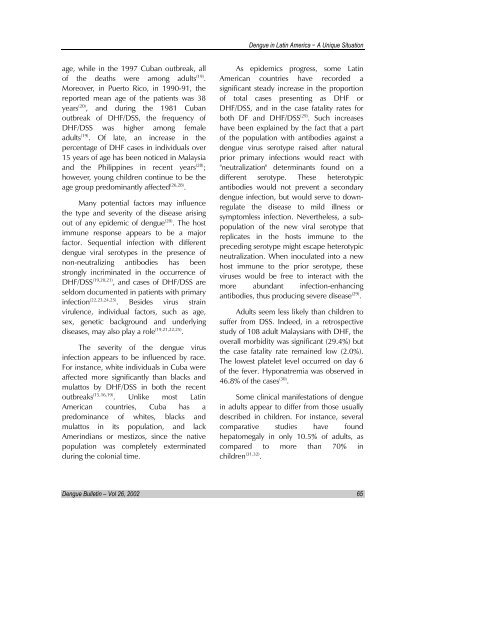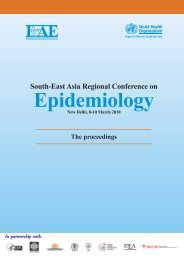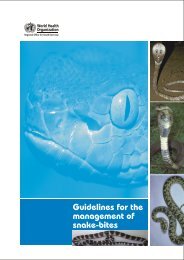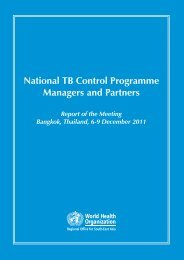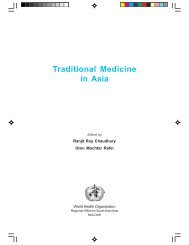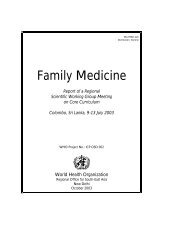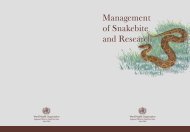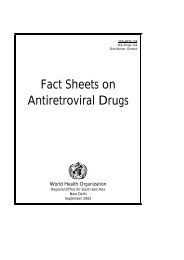Dengue Bulletin
Dengue Bulletin
Dengue Bulletin
- TAGS
- dengue
- bulletin
- 203.90.70.117
You also want an ePaper? Increase the reach of your titles
YUMPU automatically turns print PDFs into web optimized ePapers that Google loves.
age, while in the 1997 Cuban outbreak, all<br />
of the deaths were among adults (19) .<br />
Moreover, in Puerto Rico, in 1990-91, the<br />
reported mean age of the patients was 38<br />
years (20) , and during the 1981 Cuban<br />
outbreak of DHF/DSS, the frequency of<br />
DHF/DSS was higher among female<br />
adults (19) . Of late, an increase in the<br />
percentage of DHF cases in individuals over<br />
15 years of age has been noticed in Malaysia<br />
and the Philippines in recent years (28) ;<br />
however, young children continue to be the<br />
age group predominantly affected (26,28) .<br />
Many potential factors may influence<br />
the type and severity of the disease arising<br />
out of any epidemic of dengue (20) . The host<br />
immune response appears to be a major<br />
factor. Sequential infection with different<br />
dengue viral serotypes in the presence of<br />
non-neutralizing antibodies has been<br />
strongly incriminated in the occurrence of<br />
DHF/DSS (19,20,21) , and cases of DHF/DSS are<br />
seldom documented in patients with primary<br />
infection (22,23,24,25) . Besides virus strain<br />
virulence, individual factors, such as age,<br />
sex, genetic background and underlying<br />
diseases, may also play a role (19,21,22,25) .<br />
The severity of the dengue virus<br />
infection appears to be influenced by race.<br />
For instance, white individuals in Cuba were<br />
affected more significantly than blacks and<br />
mulattos by DHF/DSS in both the recent<br />
outbreaks (15,16,19) . Unlike most Latin<br />
American countries, Cuba has a<br />
predominance of whites, blacks and<br />
mulattos in its population, and lack<br />
Amerindians or mestizos, since the native<br />
population was completely exterminated<br />
during the colonial time.<br />
<strong>Dengue</strong> in Latin America − A Unique Situation<br />
As epidemics progress, some Latin<br />
American countries have recorded a<br />
significant steady increase in the proportion<br />
of total cases presenting as DHF or<br />
DHF/DSS, and in the case fatality rates for<br />
both DF and DHF/DSS (29) . Such increases<br />
have been explained by the fact that a part<br />
of the population with antibodies against a<br />
dengue virus serotype raised after natural<br />
prior primary infections would react with<br />
"neutralization" determinants found on a<br />
different serotype. These heterotypic<br />
antibodies would not prevent a secondary<br />
dengue infection, but would serve to downregulate<br />
the disease to mild illness or<br />
symptomless infection. Nevertheless, a subpopulation<br />
of the new viral serotype that<br />
replicates in the hosts immune to the<br />
preceding serotype might escape heterotypic<br />
neutralization. When inoculated into a new<br />
host immune to the prior serotype, these<br />
viruses would be free to interact with the<br />
more abundant infection-enhancing<br />
antibodies, thus producing severe disease (29) .<br />
Adults seem less likely than children to<br />
suffer from DSS. Indeed, in a retrospective<br />
study of 108 adult Malaysians with DHF, the<br />
overall morbidity was significant (29.4%) but<br />
the case fatality rate remained low (2.0%).<br />
The lowest platelet level occurred on day 6<br />
of the fever. Hyponatremia was observed in<br />
46.8% of the cases (30) .<br />
Some clinical manifestations of dengue<br />
in adults appear to differ from those usually<br />
described in children. For instance, several<br />
comparative studies have found<br />
hepatomegaly in only 10.5% of adults, as<br />
compared to more than 70% in<br />
children (31,32) .<br />
<strong>Dengue</strong> <strong>Bulletin</strong> – Vol 26, 2002 65


